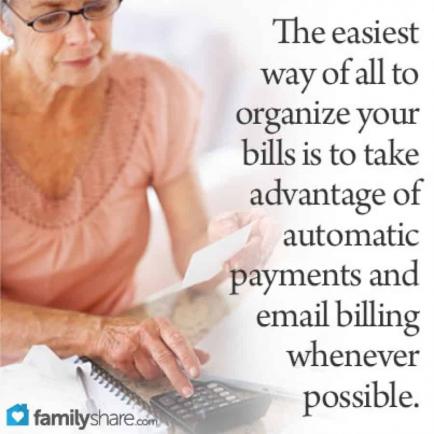
One of the most important home organization tasks you can do is get your monthly bills organized. Paying bills may not be the funnest task in the world, but by creating a system for the monthly expenses the job will be faster - and take away the worry of forgetting one.
Begin at the mailbox
Monthly bill organization starts the moment you get your mail. Train yourself to deal with mail the moment you bring it into the house instead of making piles or throwing it into corners. Stand over your paper recycling container and throw in the junk mail.
Sort
The bills that remain in your hand, after you've thrown away the junk, need to be sorted by date. If you've received bills that aren't due right away, figure out a filing system to keep bills in order. An expandable file with multiple pockets is one idea, or several file folders in a drawer or file holder. Group them according to when they need to be paid.
Plan
Do you prefer to pay your bills once a month, twice a month, or as they arrive? It's more efficient to pay multiple bills in one sitting, when you have your materials out and are in that mindset. If you decide to pay bills only once a month, be sure you plan the bill paying session at a time of the month that will cover all your due dates, so you aren't late on anything. Credit card companies often inflict heavy late charges if the payment is even one day late.
Having a set day every month for paying bills is an easy way to remember to get the task done, but sometimes this doesn't work for certain budgets. If you need to pay bills multiple times per month and are afraid you may forget, make a note on a calendar as if the bill is an appointment to keep. Computer and cell phone calendars also work well for this, as you can set a reminder alarm for each.
File
It's a good idea to keep certain billing statements for reference if there is ever a question on your account. The length of time you should keep them differs. You can file them by account or by month - just think how it will be easiest for you to find the item if you have to refer to it later.
Modern computer scanners can help reduce the amount of paper you have to keep. It's easy to scan a bill and store the digital document in a "designated bills" folder on your computer. One big advantage to this is that computer files are easily searchable, so finding that certain bill won't be difficult. In this day of increased digitalization, an original copy of a bill, rather than a scanned copy, is practically never needed. Be sure to keep good electronic backup copies of your financial documents.
The easiest way of all to organize your bills is to take advantage of automatic payments and email billing whenever possible. You'll love the convenience.

